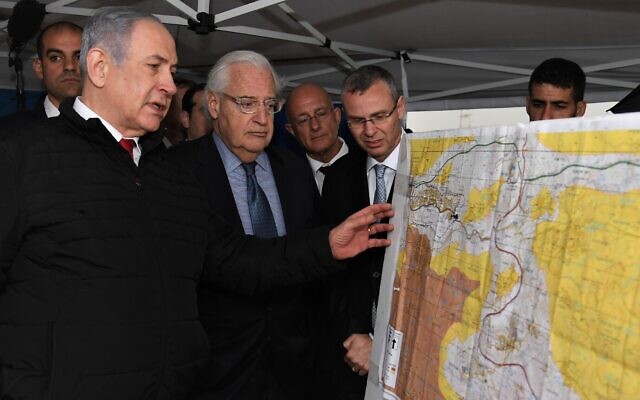David Friedman tells newspaper that applying sovereignty in parts of West Bank is up to Israel, as long as it’s done within framework of Trump peace plan
In the latest show of American support for Israeli plans to annex parts of the West Bank, US Ambassador David Friedman said in an interview that Washington is ready to recognize Israeli sovereignty in the disputed areas should it be declared in the coming weeks.
In an interview with the pro-ruling party Israel Hayom daily published Wednesday, Friedman said that it is up to Israel to decide whether it wants to move forward with annexing settlements but that if it does, Washington will recognize the move.
“We are not declaring sovereignty, but rather Israel, and then we are ready to recognize it,” he said.
“When the mapping process is over, when the Israeli government agrees to freeze building in the same parts of Area C that aren’t designated for the application of sovereignty and when the prime minister agrees to negotiate with the Palestinians on the basis of the Trump plan — and he already agreed to this on the first day — we’ll recognize Israel’s sovereignty in areas that according to the plan will be a part of it,” he said in comments published in Hebrew.
Last week, amid reports intimating that the White House was conditioning its support for Israeli annexation of parts of the West Bank on negotiations over a Palestinian state, the Trump administration stressed that it continued to back Israel’s annexation plans, as long as they’re carried out in the framework of the peace plan US President Donald Trump presented on January 28.
According to the proposed plan, the US will recognize an Israeli application of sovereignty over parts of the West Bank following the completion of a survey conducted by a joint US-Israel mapping committee and Israel’s acceptance of both a four-year freeze of the areas earmarked for a future Palestinian state and a commitment to negotiate with the Palestinians based on the terms of Trump’s peace deal.
Despite the stipulation that Israel impose a partial settlement freeze, Friedman told Israel Hayom that the communities in question will be able to expand within their municipal boundaries even if they are prohibited from growing their footprints on the ground.
Under the coalition deal reached between Prime Minister Benjamin Netanyahu’s Likud and the Blue and White party last month, the next government can begin passing legislation to annex the Jordan Valley and West Bank settlements after July 1; the prospective government has yet to be formed.
After the announcement of the unity deal last month, US Secretary of State Mike Pompeo declared that annexation is not something for Washington to interfere with.
“The Israelis will ultimately make those decisions. That’s an Israeli decision, but we’ll work closely with them to share our views of this in a private setting,” he said during a press conference.
Less than a week later, on April 27, a State Department spokesperson reiterated that the US was ready to recognize Israel’s annexation of parts of the West Bank but asked Israel’s government to also negotiate with the Palestinians.
“As we have made consistently clear, we are prepared to recognize Israeli actions to extend Israeli sovereignty and the application of Israeli law to areas of the West Bank that the vision foresees as being part of the State of Israel,” the spokesperson said.
“The annexation would be in the context of an offer to the Palestinians to achieve statehood based upon specific terms, conditions, territorial dimensions and generous economic support. This is an unprecedented and highly beneficial opportunity for the Palestinians,” he said.
The Palestinian Authority and much of the international community has rejected the Trump plan. Senior officials in the European Union and United Nations on have warned Israel against the intention to annex parts of the West Bank, with EU foreign policy chief Josep Borrell saying that such a move “would constitute a serious violation of international law.”
The US had initially called on Israel to slow down on annexation when Netanyahu vowed to swiftly start annexing parts of the West Bank moments after the White House unveiled its peace proposal. Though Friedman initially backed the move happening immediately upon the release of the Trump plan, Jared Kushner, Trump’s son-in-law and the chief architect of the plan, said publicly he expected Israel to wait at least until after Knesset elections.
In his remarks to Israel Hayom, Friedman asserted that Israelis across the political spectrum supported the Trump plan and that “just as Americans would never relinquish the area on which the Statue of Liberty stands, even though it’s a very small area, Israel would never agree to give up” settlements like Beit El and Hebron.
Settlement leaders welcomed Friedman’s comments on Wednesday, even as they remained divided on the merits of the overall Trump plan.
Oded Revivi, mayor of the Efrat settlement, pointed to Chaim Weizmann’s backing of the decisions at the San Remo conference 100 years ago “even though the entire Zionist dream wasn’t realized” and David Ben-Gurion’s acceptance of the UN partition plan in 1947 despite reservations about the proposed borders of a Jewish state.
“The same courage is now required from the right-wing and settlement leadership to say yes despite the conditions and the challenges,” he said in a statement.
Source: Times of Israel
